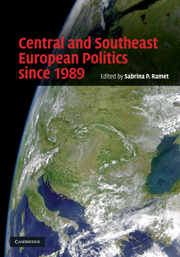Book contents
- Frontmatter
- Contents
- List of figures and maps
- List of tables
- Notes on the contributors
- Preface
- List of acronyms and abbreviations
- Guide to pronunciation of Central and Southeast European words
- 1 Central and Southeastern Europe, 1989
- 2 Central and Southeastern Europe, 2009
- Part 1 Introduction
- Part 2 Issues
- Part 3 Central Europe
- Part 4 Yugoslav Successor States
- 11 Slovenia since 1989
- 12 Politics in Croatia since 1990
- 13 Serbia and Montenegro since 1989
- 14 Bosnia and Herzegovina since 1990
- 15 Macedonia since 1989
- 16 Kosova: resisting expulsion and striving for independence
- Part 5 Southeastern Europe
- Part 6 Former Soviet republics
- Part 7 Present and future challenges
- Index
- References
15 - Macedonia since 1989
Published online by Cambridge University Press: 05 June 2012
- Frontmatter
- Contents
- List of figures and maps
- List of tables
- Notes on the contributors
- Preface
- List of acronyms and abbreviations
- Guide to pronunciation of Central and Southeast European words
- 1 Central and Southeastern Europe, 1989
- 2 Central and Southeastern Europe, 2009
- Part 1 Introduction
- Part 2 Issues
- Part 3 Central Europe
- Part 4 Yugoslav Successor States
- 11 Slovenia since 1989
- 12 Politics in Croatia since 1990
- 13 Serbia and Montenegro since 1989
- 14 Bosnia and Herzegovina since 1990
- 15 Macedonia since 1989
- 16 Kosova: resisting expulsion and striving for independence
- Part 5 Southeastern Europe
- Part 6 Former Soviet republics
- Part 7 Present and future challenges
- Index
- References
Summary
Macedonia, an independent state since September 1991, has a long and controversial history. The first recorded states on the territory of today's Republic of Macedonia were the Thraco-Illyrian Kingdom of Paionia and the Kingdom of Macedon. Alexander the Great, who ruled as King of Macedon 336–323 bce, built a huge empire, which extended as far as present-day Afghanistan but after his death his empire fell apart. The region became part of the Roman Empire in 146 bce, and after the division of that Empire in 285 ce was part of the Eastern Roman (or Byzantine) Empire.
Slavs came to the region of present-day Macedonia in the 580s ce. In the tenth century, the region came under Bulgarian rule, but the Byzantines had reasserted control by 1018. In the fourteenth century, the region of Macedonia fell under Serbian control but by 1395 Macedonia had become part of the Ottoman (Turkish) Empire. Macedonia remained under Ottoman rule until the Balkan Wars of 1912–13, when it was annexed by Serbia. After the First World War, Macedonia was incorporated into the Kingdom of Serbs, Croats, and Slovenes, renamed the Kingdom of Yugoslavia in October 1929.
During the Second World War, most of Macedonia was occupied by Bulgarian forces. But after the war when the communists took over Yugoslavia, Macedonia was incorporated as one of six constituent republics and, over time, its autonomy expanded.
- Type
- Chapter
- Information
- Central and Southeast European Politics since 1989 , pp. 328 - 357Publisher: Cambridge University PressPrint publication year: 2010
References
- 7
- Cited by



